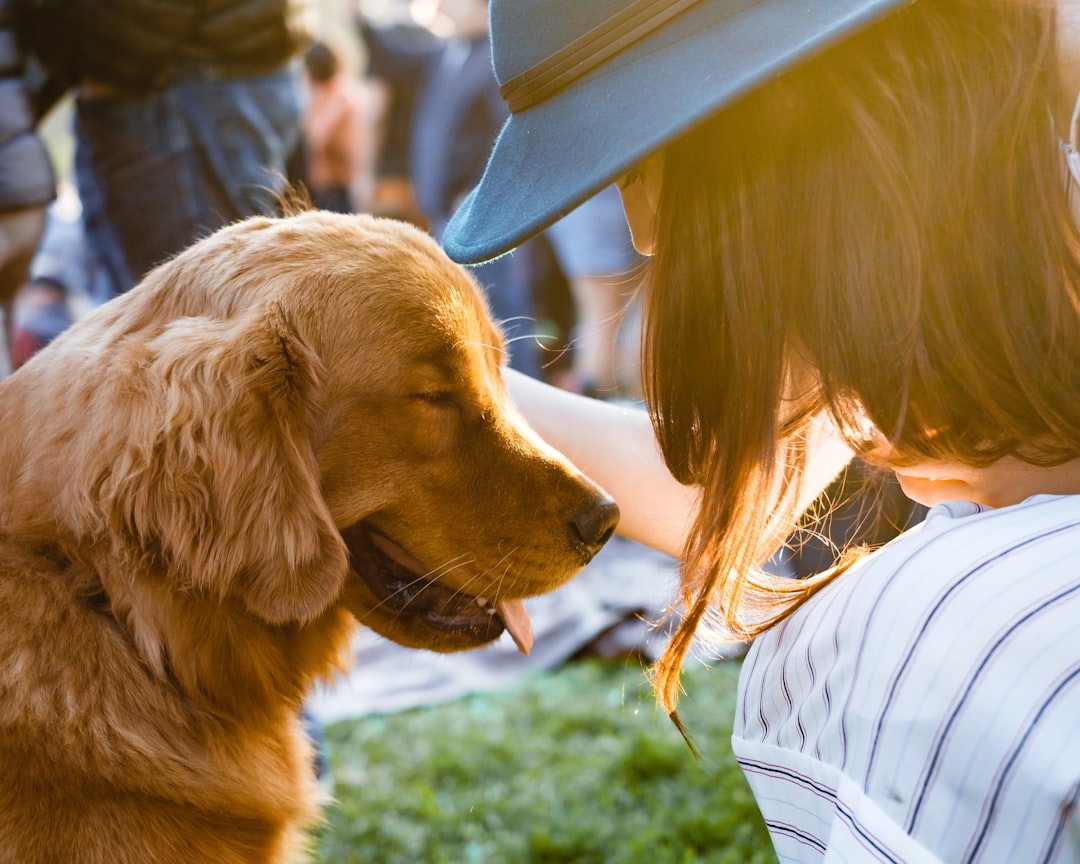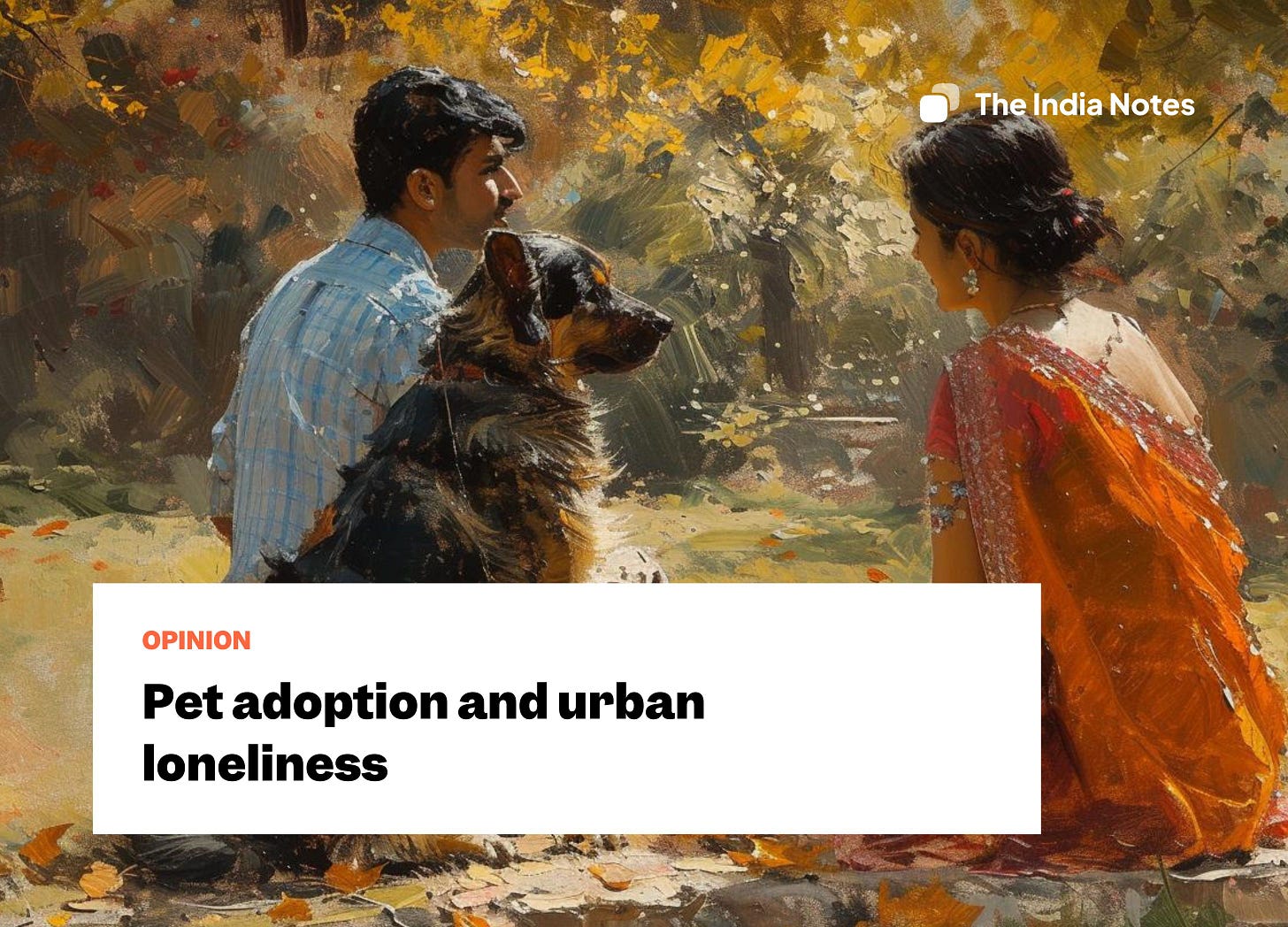Are pets a solution to urban loneliness? 🐶
Double Income. No Kids. Only a dog.
Today's edition of 'The India Notes' is a little special. From the very beginning, our dream for this community was to create a space where voices from diverse backgrounds could come together and share their unique viewpoints. Guest posts are a small step towards it. Here is the first edition, where Sunaina Pattnaik talks about urban loneliness and pet adoption.
I (delightfully) spent almost two hours at a pet store with a friend who was shopping for his pet's birthday. Today, pet parents throw elaborate parties for their pets — often at pet parks. There has been a massive shift in how we treat our pets. Adopting indies and fostering strays has made us more social and less anxious, which makes you wonder if pets are a solution to loneliness.
What's the connection between pets and urban loneliness? I explore this theme in this post.
I spoke to two individuals: Harini (name changed), a 32-year-old engineer and artist who lives with her husband in a gated community, and Aravind (name changed), a 31-year-old developer who lives with his parents in a villa. Both have fostered strays before adopting them; treating pets like family is second nature to them. However, we see this in multiple individuals around us owing to a mindset shift: humanising animals. 👇
Humanisation of pets
The India International Pet Trade Fair reported that Indians adopt 6,00,000 pets annually, with dogs being the most popular pets. The humanisation of pets plays a vital role, meaning you treat pets like family, tending to their needs and celebrating their milestones.
Harini lives with her spouse and two dogs and says she got her first dog as she needed company. Her spouse works at night, so having her pets around helps. She states,
"Choosing my first dog was purely based on appearance. I didn't know about unethical breeding practices but learned a lot when I fostered indies. We eventually rescued our second dog, who turns four this year."
When Aravind's father saw the mother (an indie) of some puppies die, he decided to adopt one. Eventually, most of them got adopted. Aravind spends between 2 and 2.5 hours with his pet, including play and walk time, while Harini usually spends 4 to 5 hours. She says,
"We play in the evening, watch birds on the balcony or enrich them with treats. As they grow old, they tend to sleep a lot."
When I talk about the humanisation of pets, I mean it. When you spend time with Harini or Aravind, they share one quality: not just treating their pets like family but also gushing over their antics and food habits as parents do. Harini occasionally reads stories to her pets while Aravind watches and observes his pet's reactions while watching movies together.

The rise in disposable income
Pet parents spend about INR 5,000 to 6,000 every month on their pets, and the expenses can rise to INR 10,000 when pet visits or vaccinations are involved. Harini says,
"Pet expenses have risen; a vet visit costs us around INR 5,000. But feeding them a balanced diet, regular grooming and maintaining a good dental regime reduces the expenditure."
But growing revenue and double-income couples, despite the challenge, find it manageable. This is why people with disposable income or nuclear families are embracing pet adoption; it's the most significant reason that enables pet parents to cater to their pets' healthcare needs as much as their indulgences.
Harini spends about INR 8,000 to 10,000 on her pets every month, with food as the majority of the expenditure. She says,
"We feed a small serving of Pedigree (30kg). Our pets get a variety of protein such as beef, pork, and chicken, along with vegetables, oats and coat supplements with their food. Monthly expenses include pet wipes, dog grooming, vet visits, and raw dehydrated treats for their dental health. Dog walkers charge a hefty price, too."
Aravind spends around INR 5,000 to 6,000 per month on essentials and non-essentials. He says,
"I spend INR 3,000 to 4,000 on food and vet care. The non-essentials like treats and toys cost INR 1,000 to 2,000; he loves squeaky toys and goes through one every 5-7 days."
Aravind feeds his pet Drools sometimes, but for the most part, he provides homemade food. Their go-to brands are Heads Up for Tails, Sara's Treats, and Pet Set Go.

Are pets a cure for loneliness?
Times Of India called loneliness a public health hazard!
Urban loneliness has multiple reasons, including nuclear families, moving away from home, 9-5 jobs becoming 9-9 jobs, mental health, and lifestyle. Fostering pets helps reduce anxiety and loneliness, bringing a routine you can lean on.
Harini says,
"I have been battling depression for a few years, but my pets have made such a profound difference in my recovery. They heal you in a way people can't even with words. They love unconditionally — a good reminder of why you should never give up. My pets have rescued me."
Aravind's family gets their daily serotonin boost from their pet. He says,
"My parents are in their 60s, and they act silly and play with this menace. On the days you're feeling low, getting out is essential and having a pet makes you get out of bed. My pet wakes up at 6 am and demands a walk. An animal's circadian rhythm is one of the most consistent things in this world."
The government establishing pet parks in tier-1 cities positively impacts those who aren't even pet parents. I've seen many without pets visit these parks to interact with others' pets. I encountered a 62-year-old retiree living alone in a gated community about five minutes from a dog park. Her children work in the US, and she told me she found a community with pets and their parents, especially during the COVID-19 pandemic.
Using a WhatsApp group to plan their outings has become a ritual; after most visits, they hang out at an adjacent cafe serving pet food. These moments are reminiscent of parents spending time with other parents while watching over their children at parks.
For Harini, pets have driven a maternal instinct. She says,
"I always wanted to be childless and went into my marriage with the same opinion. However, after adopting pets, my desire for a child emerged. Pets provide a great reality check if you are unsure about becoming a parent. They require much time and patience; it's a big responsibility. A child will need so much more than that."
Aravind and his parents divide walking and feeding responsibilities. He laughs, adding,
"I'm a SINK (Single Income, No Kids) and a person with limited responsibilities. While I don’t find spending time and money on my pet challenging, it's a huge responsibility to bring home a pet. Just like babies, it takes a village to raise pets."
Whether the urban population is seeking companionship through pets or looking at them as an alternative for children, one thing is certain: pets fill a void. They may not be a foolproof solution to loneliness, but they bring semblance of calm and perhaps even hope.
(Fin)
In the comments below, let us know what you think of the rise in pet adoption.





I also love pets but they cant replace human touch.I see couples bending backwards for their pets but not fond of children.